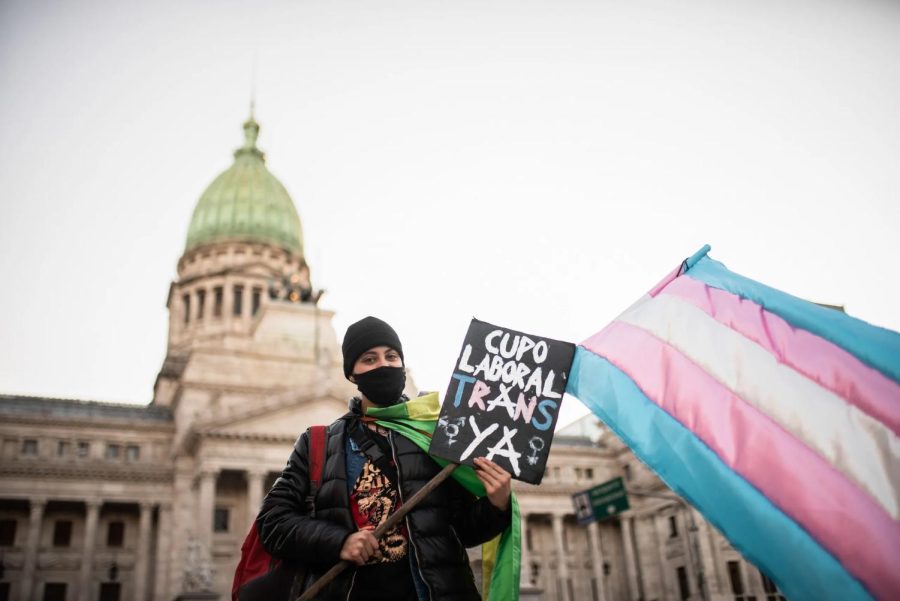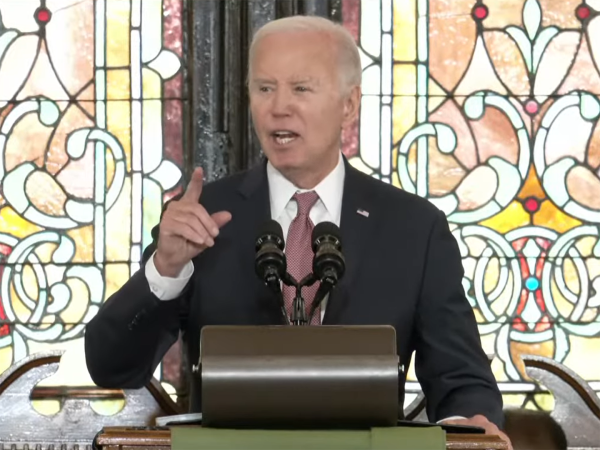Argentina is Paving the Way for the Transgender Rights Movement
Los derechos trans son derechos humanos.
The history of the Transgender Rights Movement not only comprises of the legal struggles transgender, gender noncomforming, and intersex (TGI) people have faced, but also of the byproducts that unfortunately stem from identifying as transgender, such as poverty, sexual assault, and property victimization. In fact, UCLA’s School of Law reported that transgender people are “over four times more likely than cisgender people to be victims of violent crime.”
Just roughly three weeks ago on January 19th, a transgender rights organization, The TransLatin@ Coalition, received a bomb threat targeting their Los Angeles office. No reason was given for this threat other than the caller being against the Transgender Rights Movement, further proving that even today, TGI people are not able to live without fearing for their well-being. While progress has been made for the Transgender Rights Movement, it is apparent that more effort needs to be put toward ensuring the safety and equality of transgender people through legal policies and government intervention.
Transgender people are over four times more likely than cisgender people to experience violent victimization, including rape, sexual assault, and aggravated or simple assault.
— Rachel Dowd, UCLA School of Law Williams Institute
Fortunately, one country has already started making considerable strides toward creating a safer, more inclusive environment for TGI people: Argentina.
Argentina’s Gender Identity Law was passed back in May of 2012, and it includes fifteen extensive articles to legally permit TGI people to be treated accordingly with their gender identity. One of the most significant articles is the first, which proclaims Argentinians’ “right to gender identity.”
Article 1 – Right to Gender Identity
All persons have the right,
1. To the recognition of their gender identity;
2. To the free development of their person according to their gender identity;
3. To be treated according to their gender identity and, particularly, to be identified in that way in the documents proving their identity in terms of the first name/s, image and sex recorded there.
* If you wish to view the entire breakdown of the Gender Identity Law, you can find it here.
Although the United States is deemed the richest developed country in the world, it allows for a large majority of its population to live as though they reside in an underdeveloped country. Here in the United States, there is not a single, explicit federal law protecting the rights of or demanding the equal treatment of the transgender community; this is a major cause for the high rates of violence toward TGI people.

Enveloped in Argentina’s Gender Identity Law, transgender people are given the right to change (and be recognized as) their gender indentity without having undergo hormone therapy, surgery, or a psychiatric diagnosis to “prove” their gender identity. This means that Argentinians are free to make “changes to [their] gender, image, or birth name on civil registries without the approval of a doctor or a judge,” as told by The Washington Post. Additionally, the policy grants all TGI people free healthcare for any desired surgeries and transition-related care. This law was the first of its kind, and it established Argentina “as the most trans-friendly legal environment in the entire world,” according to The National LGBTQ Task Force.
While those policy changes in of themselves were monumental, the South American country has recently further advanced their national transgender rights laws to recognize non-binary identities, such as for people who use they/them pronouns or any pronouns that do not fall within the binary genders’ pronouns (she/her and he/him). As of the summer of 2021, Argentinian official documents, like passports and IDs, recognize three gender categories: “X” (Unspecified), “F” (Female), and “M” (Male). Previously, TGI people were required to declare one of the binary genders for legal documents, undermining a whole population of people who do not identify with either the female or male gender. At the time of this change, 34 year old doctor Gerónimo Carolina González Devesa revealed how impactful this policy was for people like them, and what it meant to have their non-binary identity acknowledged by the Argentinian government:
Leaving this binary [system] implies being able to start working in a world in which all people can enter and that effectively respects all identities. And it’s wonderful, the realization that this change is finally coming.
— Gerónimo Carolina González Devesa via Human Rights Watch
The United States issued its first nonbinary passport in late October of 2021 to Dana Zzyym, an intersex activist who had been battling the use of binary gender passport since 2015. Even though Zzyym now possess a nonbinary United States passport, this option is still not accessible nationwide. United States Secretary of State, Antony Blinken, announced in June of 2021 that the government would adjust passports to include nonbinary markers; however, the process would take some time. As of now, the United States passport application still only allows for applicants to choose between “F” (Female) and “M” (Male) when declaring their gender identity, but hopefully in the near future this will become more inclusive.

Furthermore, Argentina has made great strides toward gender equality and security with the execution of the law that requires for 1% of all public sector jobs to be held by a transgender person. This law not only allots a portion of jobs to transgender-identifying people, but it also recognizes the hardships that transgender people may have dealt with. For example, some criminal records may be excused for certain jobs, and education requirements may be altered to better reflect the tribulations TGI people have faced that could have disrupted their education or upbringing.
The average life expectancy for the trans community in Argentina is only 41 years old. The general statistics that they said while they were debating the law is that as many as 90% of the trans population never had a formal job.
— Daniel Politi via NPR
In an interview with NPR host Lulu Garcia-Navarro, Daniel Politi, a reporter based in Buenos Aires, Argentina, discloses that the public reaction to this policy was “quite muted” due to the country being “very socially liberal.” In a way, this can be seen as reassuring, for Argentina is so progressive that these laws are not considered “breaking stories” or “out of the ordinary;” they are just policies that are intended to better the lives of its people, and that is not an issue for the citizens. While Politi did mention that there was some opposition after the legislation, he noted that it was mainly due directed toward the failing economy, not the inclusion of TGI people into the workforce.
Politi also imparted that the transgender people that he talked to “see the job, the entry into the workforce, as the way to lead a better life.” A lot of transgender people are not granted the same opportunities for employment as cisgendered people; many transgender people, especially transgender women, are forced to go into prostituion as a means of making an income. The new policy not only permits many to advance in their careers and make a living, but it also aids in ending the stigmas concerning TGI people in society. If you wish to hear the interview between Garcia-Navarro and Politi in its entirety, see below.
Argentina has proven itself to be a leader of the Transgender Rights Movement through its curation of profound policies and overall apprehension of the discrimination that many transgender people face. Although the country’s inclusion and protection of its transgender citizens should be celebrated, it is important to recognize that debates concerning human rights are not necessarily debates we should still be having. And in saying that, my intention is not to diminish the progress that has been made for TGI people, but to state that our standards need to be higher.
Hopefully it will not be long until other nations and leaders follow in Argetina’s footsteps.


















